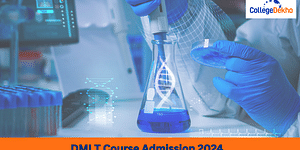Clinical Research
Clinical Research Overview
Clinical Research is a branch of medical science that students can take up after the completion of the higher secondary degree in the science stream. The curricular work of Clinical Research involves studies about the safety and effectiveness of treatments, diagnostics, and pharmaceuticals for human use. One can pursue this course at the undergraduate level after completing class 12 which may last from six months to five years. After completing a bachelor’s degree, students can pursue post graduation and a doctorate in clinical research.
The scope for clinical research has surged since Covid-19 as India has intensified clinical research efforts. To be eligible for clinical research courses, students must pass entrance exams like NEET, IUET, NIMS, CUCET, etc. These courses are delivered in both offline and online modes. Some of the top colleges in India offering clinical research courses are ICRI Dehradun, Saveetha University, Asian Institute of Health Sciences, ICBio Clinical Research, etc.
On average, the course fee ranges from INR 10,000 (certification) to INR 5 lakhs. After completing clinical research studies, candidates can pursue careers as clinical research analysts, clinical research associates, clinical research physicians, etc. and earn an average salary of INR 2-8 lakhs per annum.
Table of Contents
- Clinical Research Overview
- Clinical Research Courses Highlights
- Why Choose Clinical Research?
- Types of Clinical Research Courses
- Top Clinical Research Courses in India
- Entrance Exams for Clinical Research Courses
- Eligibility Criteria for Clinical Research Courses in India
- How to Get Admission to Clinical Research Courses?
- Clinical Research Courses After 12th
- Popular Clinical Research Colleges in India
- Study Clinical Research Courses Abroad
- Clinical Research Abroad Top Colleges
- Clinical Research Course Fees
- Clinical Research Syllabus
- Clinical Research Course Curriculum
- Clinical Research in India - Career and Job Prospects
- What is the Salary of a Clinical Researcher?
- Skills That Make You The Best Clinical Researcher
- FAQs about Clinical Research
Clinical Research Courses Highlights
Check out the significant highlights of the clinical research courses below:
| Name of the Course | Clinical Research |
|---|---|
| Level | Undergraduate and Postgraduate |
| Types of Courses | Diploma, Bachelors, Masters, Doctoral |
| Duration | 1-5 Years |
| Exam Type | Semester |
| Minimum Qualification Requirement | 10 + 2 |
| Average Initial Salary | INR 10,000 to 3.6 Lakhs Per Annum |
| Selection Process | Entrance Exams and University Interviews |
| Entrance Exams | NEET, IUET, NIMS, CUCET |
| Top Specialisations in India | Epidemiologic and Behavioural Research, Patient-Oriented research, Health Service research |
| Minimum Aggregate Required for Admissions | 50% to 55% |
| Major Recruiters | Hospitals and Clinics, Academic Institutes, Pharmaceutical Industries, Research Facilities, Private Health Industries, etc. |
| Top Colleges in India | AIIMS, CMC Vellore, JIPMER, ILBS, SOA, GSMC, etc. |
Why Choose Clinical Research?
There is a huge demand for qualified clinical research experts since clinical research is expanding and developing at an unprecedented rate. The industry offers many diverse job opportunities, demanding work settings, travel to various research centres, writing reports, and getting to know people through clinical trials or working for several firms.
Types of Clinical Research Courses
Clinical research courses are offered in India at undergraduate and postgraduate levels. The different types of clinical research courses offered are:
Certifications
Diploma (UG/PG)
Bachelors
Masters
Doctoral
Depending on their field of interest, a candidate can select a subject in these three major fields of clinical research:
Epidemiologic and Behavioral Research
Patient-Oriented Research
Health Service Research
Top Clinical Research Courses in India
Students can choose to pursue a certification, diploma, PG diploma, bachelors, masters, and PhD courses in clinical research as per their requirements. Check out detailed information about each course below:
Certificate in Clinical Research
Clinical research certificate courses can be pursued after 10+2 or after a bachelor’s degree, depending on the course format.
Diploma in Clinical Research
Diploma curriculum is structured in a way that helps prospective applicants to understand the bioethics that applies in a hospital or clinic. A 55% aggregate or a degree obtained from a reputable university is a requirement for admission.
BSc in Clinical Research
BSc in Clinical Research & Healthcare Management is a three-year full-time degree. The first year is devoted to the fundamental knowledge of management sciences, while the second and third years are devoted to specialisation in topics related to healthcare and clinical research.
MSc in Clinical Research
The two-year full-time MSc Clinical Research programme is designed specifically for individuals who have a strong interest in medical sciences. Candidates for the MSc Clinical Research programme must have completed their BSc at an accredited college or university.
Doctorate in Clinical Research
A three-year doctoral-level programme called a PhD in clinical research focuses on the study of clinical components. The curriculum is set up to enable students towards getting ready for careers in clinical or translational research.
Entrance Exams for Clinical Research Courses
Numerous entrance tests are conducted by colleges at various levels for admission to clinical research courses, including UG PG, and PhD. The following are a few of them:
National Eligibility cum Entrance Test (NEET)
The NEET exam is the premier all-Indian test for medical and allied disciplines. Many colleges that offer courses in clinical research need applicants to submit NEET scores to be considered for admission.
Institute of Clinical Research (ICRI) Entrance Test
One of the most well-known clinical research organisations in the nation, ICRI provides a wide range of clinical research courses at the undergraduate, graduate, and doctoral levels along with excellent employment prospects.
NIMS University Entrance Test
In India, NIMS University is a renowned institution for providing clinical research courses. One must pass the entrance exam offered by the university itself to be considered for admission.
Eligibility Criteria for Clinical Research Courses in India
The primary prerequisite for enrolling in a Clinical Research course is completing 12th grade from an accredited educational board. Here are the detailed eligibility criteria:
For certification, diploma, and undergraduate courses including BSc Clinical research, candidates must complete 10+2 from a recognised educational board. Minimum GPA or marks requirement will depend on the university/college.
For most diploma and undergraduate courses, applicants are required to have a minimum of 50% marks in Chemistry, Physics, and Biology in class 12.
For PG Diploma courses and other master’s courses, applicants require a bachelor’s degree in a relevant discipline and at least 55% aggregate.
For doctoral courses, one must complete a master's degree from a recognised university in a relevant field with at least 55% marks.
How to Get Admission to Clinical Research Courses?
Candidates who are interested in enrolling in clinical research courses should fill out an application form online or submit it to their preferred institution with the required documents and application fee. Candidates will be notified via email once they have been selected based on a screening exam and an interview.
Clinical Research Courses After 12th
Here we have provided a list of Clinical Research Courses after the 12th for the convenience of the students:
| Course Name | Course Fee |
|---|---|
| BSc Clinical Research | INR 50,000 to INR 1,20,000 |
| PG Diploma in Clinical Research | INR 45,000 to INR 2,00,000 |
| Certificate in Clinical Research | INR 15,000 to INR 80,000 |
| MA in Clinical Psychology | INR 20,000 to INR 1,75,000 |
| Diploma Programme in Clinical Research (DCR) | INR 15,700 to INR 50,600 |
Online Clinical Research Courses
Some of the popular clinical research courses that candidates can pursue in online mode are as follows:
| Course Name | Average Fee |
|---|---|
| Clinical Research for Beginners | INR 5,000 to INR 10,000 |
| Design and Interpretation of Clinical Trials | INR 5000 to INR 12,500 |
| Clinical Research Certification Program | INR 30,000 to INR 50,000 |
| The Simplest Guide to Clinical Trials Data Analysis with SAS | INR 7,900 to INT 15,600 |
| Clinical Research Certification Program for Investigators | INR 20,000 to INR 40,000 |
Popular Clinical Research Colleges in India
The following are a few of the top colleges in India that provide undergraduate, graduate, and diploma programmes in this field:
Post Graduate Institute of Medical Education & Research, Chandigarh |
|
|---|---|
|
JIPMER, Pondicherry |
|
|
ILBS, Delhi NCR |
SOA Bhubaneswar, Orissa |
|
GSMC Mumbai |
|
|
JSS Academy of Higher Education & Research, Mysore |
|
Study Clinical Research Courses Abroad
In today's world, clinical research has become increasingly popular among medical students due to the multitude of health issues that exist. Despite being most widely studied as a master's degree, clinical research is also available as a bachelor's degree in the USA and other countries. Clinical research associates and physicians are also in high demand internationally due to health problems throughout the world.
Clinical Research Abroad Top Colleges
The table below shows the top colleges to study clinical research courses abroad along with their respective cities and countries:
College/University |
Location/Country |
|---|---|
|
Adler University |
Chicago, USA |
|
Algonquin College |
Woodroffe, Canada |
|
Alliant International University |
Alhambra, USA |
|
American University of Health Sciences |
Signal Hill, USA |
|
Anhui Medical University |
Anhui-Hefei, China |
|
Augusta University |
Augusta, USA |
|
Bond University |
Robina, Australia |
Clinical Research Course Fees
Clinical research course fees vary depending on the type of course, level, institution, etc. The following table shows the list of various clinical research course fees based on the course levels:
Course Type |
Course Fees (in INR) |
|---|---|
|
Certification |
10,000 to 40,000 |
|
Diploma & PG Diploma |
20,000 to 2,50,000 |
|
Bachelors |
20,000 to 3,50,000 |
|
Masters |
5,000 to 5,00,000 |
|
Doctorate |
30,000 to 3,60,000 |
Clinical Research Syllabus
The following table shows a list of common topics covered by various clinical research institutes:
Introduction to Clinical Research |
Clinical Trial Document |
|---|---|
|
About Pharmacology and Pharmaceutical |
Drug Regulation and Safety |
|
Basics of Pharmacovigilance |
Computational Clinical Research |
|
Clinical Data Management |
Quality in Clinical Trials |
|
Guidelines in Clinical Research |
Ethics in Clinical Research |
Clinical Research Course Curriculum
Clinical research curriculum differs depending on the type of course. It focuses on imparting a fundamental and useful understanding of clinical research and the regulations underlying it. Candidates may refer to the semester-by-semester topics listed below as a part of the BSc in clinical research course:
Semester I |
Semester II |
|---|---|
|
Spoken English |
Advanced Spoken English |
|
Management Concepts |
Organizational Behaviour And Human Resource Management |
|
Accounting-I |
Medical Therapeutics-I |
|
Fundamentals Of Clinical Research |
Pharmacology-I |
Semester III |
Semester IV |
|---|---|
|
Communicative English |
Research Methodology |
|
Analytical And Clinical Biochemistry |
Pharmacology-II |
|
Basics of Biostatistics |
Fundamentals of Clinical Trials Operations |
|
Bioethics And Biosafety |
Global Regulations of Clinical Trial |
Semester V |
Semester VI |
|---|---|
|
Fundamentals of Pharmacovigilance and Safety Reporting |
Medical Records Management |
|
Clinical Data Management |
Basic Epidemiology |
|
Medical Writing |
Quality In Healthcare and Total Quality Management |
|
Project Management |
Ethics In Clinical Research |
|
Healthcare Administration |
Hospital Management and Law |
Clinical Research in India - Career and Job Prospects
As per recent studies, the clinical research industry, which is currently witnessing business growth of about 250 crores, could soon experience growth of over 5000 crores. Clinical investigators now have several job prospects due to industries involved in research such as biotech firms, pharmaceutical companies, and research labs.
Job Profiles for Clinical Researchers
Candidates who are committed to learning about the know-how of research in the medical and clinical disciplines should strongly consider a career in clinical research. Such individuals can function as:
-
Clinical research analysts,
-
clinical research associates,
-
clinical research physicians,
-
clinical research coordinators,
-
Biostatisticians, etc.
Leading Recruiters for Clinical Researchers
The following are the leading recruiters for clinical researchers:
-
Hospitals and clinics
-
Academic institutes
-
Pharmaceutical industries
-
Research facilities and labs
-
Private health industries
-
Thinktanks
What is the Salary of a Clinical Researcher?
Clinical research has a wide range of opportunities for professionals given the expanding scope of the health sector. The following table shows the estimated average annual salary of a clinical researcher:
| Job Role | Estimated Average Annual Salary (in INR) |
|---|---|
| Clinical Research Coordinator | 2 to 12 Lakhs |
| Biostatistician | 3.2 to 15 Lakhs |
| Clinical Research Associate | 3 to 15 Lakhs |
| Clinical Supervisor | 1.8 to 3.6 Lakhs |
| Lecturer | 3.3 to 8.20 Lakhs |
Skills That Make You The Best Clinical Researcher
To succeed in clinical research and have a successful career as a clinical researcher, students should inculcate the following skills:
Analytical Skills: A clinical research student should work on developing their analytical skills so they can examine complex situations and data more effectively and find solutions.
Concentration and Patience: Clinical research demands a lot of patience and concentration. It is important to concentrate on minute aspects of clinical research methodology while performing trials or being involved in medication development.
Knowledge of Clinical Research: A researcher who lacks the knowledge of clinical research will surely face many challenges while searching for employment.
Cooperating and Coordinating Skills: A proper conversation is essential to cooperating with patients and coordinating with other personnel.
FAQs about Clinical Research
What is meant by clinical research?
In simple terms, the meaning of clinical research is the evaluation of the safety and effectiveness of treatments, diagnostics, and pharmaceuticals for human use. It provides improved patient care, emphasises expanding the understanding of diseases, creating novel medicines and medical technology, as well as developing diagnostic techniques.
What are examples of clinical research?
There could be many examples of clinical research, some of them include the following:
-
Long-term psychological testing or brain imaging.
-
Genetic testing without medication changes.
-
Studying family history which involves conversing with family members to gather information about medical history and needs.
What is the job of clinical research assistance?
The job of clinical research assistants is to assist with scientific studies or research conducted in hospitals, laboratories, and other institutions. Their responsibilities include identifying subjects for clinical trials, collecting data, evaluating results or writing reports, monitoring clinical trials, and travelling to various research centres.
What is the difference between clinical research and a clinical trial?
The difference between clinical research and a clinical trial is that a particular kind of clinical research study is a clinical trial. A clinical trial is a study that aims to provide specific answers concerning potential novel treatments or novel applications of currently accepted therapies. Clinical trials are conducted to evaluate the safety and efficacy of novel medications and therapies.
Is clinical research considered a good field?
Yes, clinical research is considered a good field in India. This is because the clinical research sector is lucrative and booming. Clinical trials are expected to generate USD 46.8 billion in revenue worldwide in forthcoming years. The field is predicted to gain considerably more implications as the demand for new medicines and vaccines intensifies.
Is PhD in clinical research worth it?
Definitely, a PhD in clinical research is worth it. Being at the top of your profession and having access to better-paying job prospects and possibilities to publish in scholarly journals are all advantages of earning a PhD in clinical research.
How do you get experience in clinical research?
You can get experience in clinical research as described in the following pointers:
-
Being a clinic volunteer
-
Working at a hospital
-
Interning at a Fortune-500 company
-
Working for a clinical research site or site network
-
Working at a healthcare start-up
-
Working at a Clinical Research Organization (CRO)
-
Working at a Site Management Organization (SMO)
-
Interning at a government (regulatory) agency
Which is better clinical research or biotechnology?
Whether clinical research or biotechnology is better, is the question of interest. It entirely depends on what the learner is interested in. Since biotech is a popular course among students, its employment prospects are better. It does not imply that there are fewer prospects for a career in clinical research. The field of clinical research is expanding and becoming more significant.
What is a diploma in clinical research?
A diploma in clinical research is a course that lasts one to two years depending upon whether you want to pursue an undergraduate diploma or PG diploma. You will gain a comprehensive understanding of all significant and pertinent knowledge areas of drug development and clinical research management through this clinical research diploma course.
What skills do you need for clinical research?
To become successful in the field of clinical research, students should possess the following skills:
-
Observation skills
-
Active listener
-
Data analysis
-
Organisation skills
-
Keen eye for detail
-
Presentation skills
-
Verbal communication skills
-
Time management
-
Work under pressure
-
Communication skills
-
Teamwork, etc.
Related Questions
Popular Courses
- Courses
- Clinical Research














